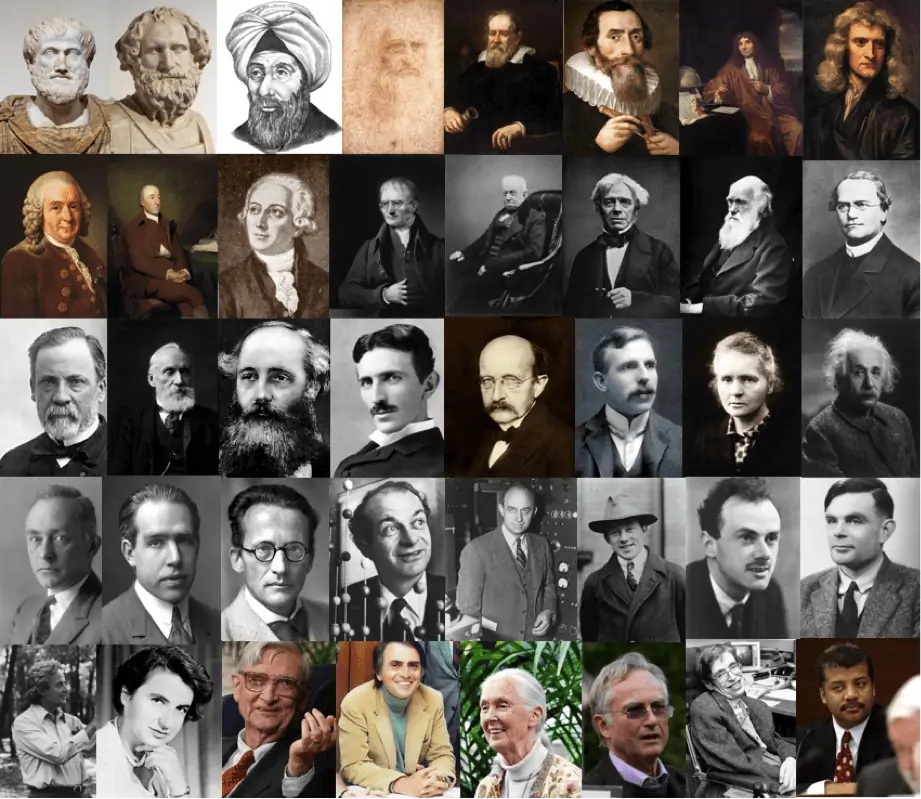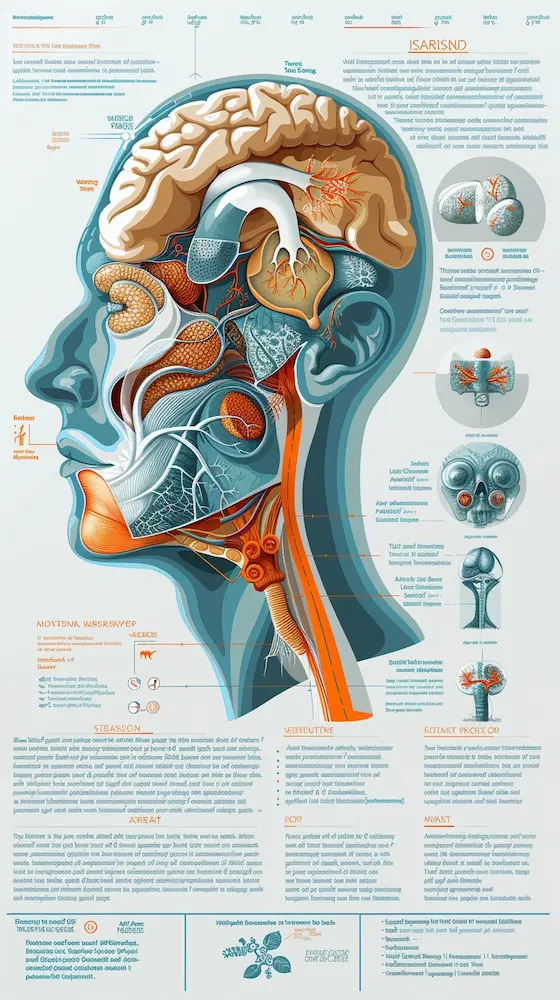100 Quiz Questions on Scientists: Dive into the fascinating world of scientific discovery with our engaging quiz! Explore the groundbreaking work of the pioneers who have shaped our understanding of the universe. From the fundamental principles of physics to the intricacies of genetics, challenge yourself to identify the scientists behind pivotal advancements.
Whether you’re a science enthusiast or just curious, test your knowledge and discover how much you really know about the minds that revolutionized science. Ready to explore? Let’s begin!
See also our Trivia game generator or Fun Facts game for even more fun!



100 Scientists Trivia Quiz
1. Who is known as the father of modern physics?
Answer: Albert Einstein
Albert Einstein is renowned for his contributions to modern physics, including the theory of relativity.
2. Who developed the theory of evolution by natural selection?
Answer: Charles Darwin
Charles Darwin formulated the theory of evolution through natural selection, detailed in his book “On the Origin of Species.”
3. Who discovered penicillin?
Answer: Alexander Fleming
Alexander Fleming discovered the antibiotic properties of penicillin, revolutionizing medicine and treatment of bacterial infections.
4. Who is famous for the laws of motion and universal gravitation?
Answer: Isaac Newton
Isaac Newton is celebrated for his three laws of motion and the law of universal gravitation, foundational principles in classical mechanics.
5. Who proposed the heliocentric theory of the solar system?
Answer: Nicolaus Copernicus
Nicolaus Copernicus proposed that the Earth and other planets orbit the Sun, challenging the geocentric model.
6. Who was the first woman to win a Nobel Prize?
Answer: Marie Curie
Marie Curie was the first woman to receive a Nobel Prize and is known for her research on radioactivity.
7. Who is known for his work on the structure of DNA?
Answer: James Watson and Francis Crick
James Watson and Francis Crick are credited with discovering the double helix structure of DNA.
8. Who developed the first successful polio vaccine?
Answer: Jonas Salk
Jonas Salk developed the first effective polio vaccine, which has played a crucial role in eradicating the disease.
9. Who is known for his work in quantum mechanics and uncertainty principle?
Answer: Werner Heisenberg
Werner Heisenberg is known for his work on quantum mechanics and the uncertainty principle, which has profound implications in physics.
10. Who is considered the father of modern chemistry?
Answer: Antoine Lavoisier
Antoine Lavoisier is often referred to as the father of modern chemistry for his role in developing the theory of chemical reactions and the law of conservation of mass.
11. Who discovered the laws of heredity through his work with pea plants?
Answer: Gregor Mendel
Gregor Mendel, through his experiments with pea plants, established the foundational principles of genetic inheritance.
12. Who invented the light bulb?
Answer: Thomas Edison
Thomas Edison is widely credited with inventing the practical electric light bulb, although many others contributed to its development.
13. Who is known for his work in electromagnetism and electromagnetic induction?
Answer: Michael Faraday
Michael Faraday made significant contributions to the fields of electromagnetism and electromagnetic induction.
14. Who discovered the circulation of blood in the human body?
Answer: William Harvey
William Harvey described the circulation of blood in the human body, transforming our understanding of the cardiovascular system.
15. Who is known for his contributions to the development of calculus?
Answer: Isaac Newton and Gottfried Wilhelm Leibniz
Both Isaac Newton and Gottfried Wilhelm Leibniz independently developed the principles of calculus.
16. Who is the physicist known for his theory of general relativity?
Answer: Albert Einstein
Albert Einstein developed the theory of general relativity, which describes gravity as a curvature of spacetime.
17. Who discovered the electron?
Answer: J.J. Thomson
J.J. Thomson is known for discovering the electron and his work in understanding atomic structure.
18. Who formulated the laws of heredity that are now known as Mendelian genetics?
Answer: Gregor Mendel
Gregor Mendel’s work with pea plants led to the formulation of Mendelian genetics.
19. Who is known for his work in the field of statistical mechanics and thermodynamics?
Answer: Ludwig Boltzmann
Ludwig Boltzmann made significant contributions to statistical mechanics and the understanding of thermodynamics.
20. Who developed the theory of special relativity?
Answer: Albert Einstein
Albert Einstein developed the theory of special relativity, which introduced groundbreaking concepts about space and time.
21. Who is known for the discovery of the neutron?
Answer: James Chadwick
James Chadwick discovered the neutron, a fundamental particle in the atomic nucleus.
22. Who is the founder of modern geology and the theory of uniformitarianism?
Answer: Charles Lyell
Charles Lyell is known for his work on the principles of geology and the theory of uniformitarianism.
23. Who made significant contributions to the field of immunology and developed vaccines for smallpox?
Answer: Edward Jenner
Edward Jenner is credited with pioneering the smallpox vaccine and contributing to the field of immunology.
24. Who is famous for his work on the principles of heredity and genetics?
Answer: Gregor Mendel
Gregor Mendel’s experiments with pea plants laid the groundwork for the field of genetics.
25. Who invented the theory of evolution by natural selection?
Answer: Charles Darwin
Charles Darwin proposed the theory of evolution by natural selection, a cornerstone of modern biology.
26. Who is known for his work on the electromagnetic spectrum and color theory?
Answer: Sir Isaac Newton
Sir Isaac Newton made important contributions to the study of light and color, including his work on the electromagnetic spectrum.
27. Who is considered the father of modern physics and quantum mechanics?
Answer: Max Planck
Max Planck is considered the father of quantum mechanics, known for his work on quantum theory and Planck’s constant.
28. Who discovered the radioactive elements polonium and radium?
Answer: Marie Curie
Marie Curie discovered the elements polonium and radium, advancing the study of radioactivity.
29. Who developed the first effective treatment for tuberculosis?
Answer: Albert Calmette and Camille Guérin
Albert Calmette and Camille Guérin developed the Bacillus Calmette-Guérin (BCG) vaccine for tuberculosis.
30. Who proposed the concept of the ‘black hole’ in astronomy?
Answer: John Michell
John Michell first proposed the concept of a ‘black hole’ in the late 18th century.
31. Who developed the first synthetic polymer, Bakelite?
Answer: Leo Baekeland
Leo Baekeland invented Bakelite, the first synthetic plastic, which had a significant impact on material science.
32. Who is known for his work on classical mechanics and the laws of motion?
Answer: Isaac Newton
Isaac Newton’s laws of motion are fundamental principles in classical mechanics.
33. Who is famous for his work in the field of atomic theory and chemical reactions?
Answer: John Dalton
John Dalton is known for his development of atomic theory and contributions to understanding chemical reactions.
34. Who discovered the structure of DNA alongside Watson and Crick?
Answer: Rosalind Franklin
Rosalind Franklin’s work with X-ray diffraction was crucial in determining the structure of DNA.
35. Who is known for the laws of heredity and the study of genetic inheritance?
Answer: Gregor Mendel
Gregor Mendel’s research on pea plants established the fundamental principles of genetic inheritance.
36. Who discovered the circulation of blood in the human body?
Answer: William Harvey
William Harvey’s work on blood circulation revolutionized the understanding of the cardiovascular system.
37. Who developed the theory of evolution by natural selection?
Answer: Charles Darwin
Charles Darwin’s theory of evolution by natural selection is a cornerstone of modern biology.
38. Who is known for the invention of the electric battery?
Answer: Alessandro Volta
Alessandro Volta invented the first chemical battery, known as the voltaic pile.
39. Who is recognized for the discovery of the laws of motion and gravitation?
Answer: Isaac Newton
Isaac Newton is renowned for his laws of motion and universal gravitation.
40. Who developed the concept of the ‘social contract’ in political philosophy?
Answer: Jean-Jacques Rousseau
Jean-Jacques Rousseau is known for his work on the social contract theory in political philosophy.
41. Who formulated the principles of classical conditioning in psychology?
Answer: Ivan Pavlov
Ivan Pavlov is known for his work on classical conditioning and the concept of conditioned reflexes.
42. Who is known for his research on the behavior of gases and the ideal gas law?
Answer: Johannes van der Waals
Johannes van der Waals is recognized for his research on the behavior of gases and the van der Waals equation.
43. Who discovered the principles of electromagnetism?
Answer: Hans Christian Ørsted
Hans Christian Ørsted discovered the principles of electromagnetism and its relation to electric currents.
44. Who is known for his work on the laws of heredity and genetic variation?
Answer: Gregor Mendel
Gregor Mendel’s research on heredity and genetic variation laid the foundation for modern genetics.
45. Who discovered the principles of inheritance and genetic linkage?
Answer: Thomas Hunt Morgan
Thomas Hunt Morgan’s work on genetic linkage and inheritance was instrumental in the development of modern genetics.
46. Who is known for the discovery of the electron and his work on atomic structure?
Answer: J.J. Thomson
J.J. Thomson discovered the electron and contributed significantly to the understanding of atomic structure.
47. Who developed the theory of general relativity and its implications for space and time?
Answer: Albert Einstein
Albert Einstein’s theory of general relativity describes gravity as the curvature of spacetime.
48. Who is famous for his work in the field of quantum mechanics and the uncertainty principle?
Answer: Werner Heisenberg
Werner Heisenberg is known for his work on quantum mechanics and the uncertainty principle.
49. Who discovered the principles of electromagnetism and its effects?
Answer: Michael Faraday
Michael Faraday’s research on electromagnetism led to the discovery of electromagnetic induction.
50. Who is recognized for his work on the principles of chemical reactions and atomic theory?
Answer: Antoine Lavoisier
Antoine Lavoisier is known for his work on the principles of chemical reactions and the law of conservation of mass.
51. Who developed the concept of the ‘black hole’ in astronomy?
Answer: John Michell
John Michell proposed the concept of black holes in the late 18th century.
52. Who is known for his contributions to the field of thermodynamics and statistical mechanics?
Answer: Ludwig Boltzmann
Ludwig Boltzmann made significant contributions to the understanding of thermodynamics and statistical mechanics.
53. Who discovered the laws of inheritance and genetic principles?
Answer: Gregor Mendel
Gregor Mendel’s work on inheritance and genetic principles laid the groundwork for modern genetics.
54. Who is famous for his contributions to the study of atomic structure and the periodic table?
Answer: Dmitri Mendeleev
Dmitri Mendeleev is known for developing the periodic table of elements.
55. Who is recognized for his work on the structure of DNA and its implications?
Answer: Francis Crick
Francis Crick, alongside James Watson, helped discover the structure of DNA.
56. Who is known for his research on radioactivity and its effects?
Answer: Marie Curie
Marie Curie conducted pioneering research on radioactivity and discovered the elements polonium and radium.
57. Who is famous for his contributions to the field of immunology and the development of vaccines?
Answer: Louis Pasteur
Louis Pasteur made groundbreaking contributions to immunology and developed vaccines for diseases like rabies and anthrax.
58. Who developed the theory of special relativity and its implications for space and time?
Answer: Albert Einstein
Albert Einstein’s theory of special relativity introduced revolutionary concepts about the nature of space and time.
59. Who discovered the principles of chemical reactions and the concept of moles?
Answer: Avogadro
Amedeo Avogadro is known for Avogadro’s law and the concept of the mole in chemistry.
60. Who is known for his work in the field of quantum mechanics and wave-particle duality?
Answer: Louis de Broglie
Louis de Broglie is recognized for his work on wave-particle duality in quantum mechanics.
61. Who developed the concept of the ‘gene’ and its role in inheritance?
Answer: Gregor Mendel
Gregor Mendel’s work laid the foundation for the concept of genes and their role in inheritance.
62. Who is recognized for his research on the nature of chemical bonds and molecular structure?
Answer: Linus Pauling
Linus Pauling made significant contributions to the understanding of chemical bonds and molecular structure.
63. Who discovered the principles of electromagnetism and its applications?
Answer: James Clerk Maxwell
James Clerk Maxwell developed the theory of electromagnetism and formulated Maxwell’s equations.
64. Who is known for his work on the theory of relativity and its impact on modern physics?
Answer: Albert Einstein
Albert Einstein’s theory of relativity revolutionized our understanding of space, time, and gravity.
65. Who developed the first effective treatment for smallpox?
Answer: Edward Jenner
Edward Jenner developed the smallpox vaccine, a significant milestone in the history of medicine.
66. Who is recognized for his contributions to the field of classical mechanics and celestial mechanics?
Answer: Isaac Newton
Isaac Newton made foundational contributions to classical mechanics and celestial mechanics.
67. Who discovered the principles of radioactivity and conducted research on radioactive decay?
Answer: Marie Curie
Marie Curie conducted pioneering research on radioactivity and discovered the properties of radioactive decay.
68. Who is known for his contributions to the development of the periodic table and chemical theory?
Answer: Dmitri Mendeleev
Dmitri Mendeleev’s development of the periodic table revolutionized chemistry.
69. Who is recognized for his work in the field of psychology and the development of psychoanalysis?
Answer: Sigmund Freud
Sigmund Freud is known for his development of psychoanalysis and theories of the unconscious mind.
70. Who developed the first successful vaccine for polio?
Answer: Jonas Salk
Jonas Salk developed the first effective polio vaccine, which played a crucial role in combating the disease.
71. Who is known for his work on the principles of electromagnetism and electric currents?
Answer: André-Marie Ampère
André-Marie Ampère made significant contributions to the study of electromagnetism and electric currents.
72. Who is recognized for his contributions to the understanding of chemical kinetics and reaction rates?
Answer: Svante Arrhenius
Svante Arrhenius is known for his work on chemical kinetics and the Arrhenius equation.
73. Who discovered the principles of genetic inheritance through his experiments with pea plants?
Answer: Gregor Mendel
Gregor Mendel’s experiments with pea plants established the principles of genetic inheritance.
74. Who is known for his research on the nature of matter and the development of atomic theory?
Answer: John Dalton
John Dalton’s work on atomic theory and the nature of matter was fundamental in the development of chemistry.
75. Who is recognized for his contributions to the study of radioactive decay and nuclear physics?
Answer: Ernest Rutherford
Ernest Rutherford conducted pioneering research on radioactive decay and is known for the Rutherford model of the atom.
76. Who developed the theory of plate tectonics and its impact on geology?
Answer: Alfred Wegener
Alfred Wegener proposed the theory of plate tectonics, which explains the movement of Earth’s lithospheric plates.
77. Who is known for his work on the structure of proteins and nucleic acids?
Answer: Linus Pauling
Linus Pauling made significant contributions to the understanding of protein structure and nucleic acids.
78. Who is recognized for his work in the field of microbiology and the study of microorganisms?
Answer: Louis Pasteur
Louis Pasteur is known for his pioneering work in microbiology and the study of microorganisms.
79. Who developed the first successful vaccine for measles?
Answer: John Enders
John Enders developed the first effective vaccine for measles, contributing to the control of the disease.
80. Who is known for his research on the behavior of gases and the ideal gas law?
Answer: Johannes van der Waals
Johannes van der Waals is recognized for his research on the behavior of gases and the van der Waals equation.
81. Who discovered the principles of thermodynamics and their applications?
Answer: Rudolf Clausius
Rudolf Clausius made significant contributions to the field of thermodynamics and the development of the second law of thermodynamics.
82. Who is known for his contributions to the study of evolution and the origin of species?
Answer: Charles Darwin
Charles Darwin’s work on evolution and the origin of species is foundational in the field of biology.
83. Who developed the theory of wave-particle duality in quantum mechanics?
Answer: Louis de Broglie
Louis de Broglie is recognized for his theory of wave-particle duality, which is a fundamental concept in quantum mechanics.
84. Who is known for his work on the development of the periodic table and chemical elements?
Answer: Dmitri Mendeleev
Dmitri Mendeleev’s development of the periodic table was a major milestone in chemistry.
85. Who discovered the principles of inheritance and genetic variation?
Answer: Gregor Mendel
Gregor Mendel’s research established the principles of genetic inheritance and variation.
86. Who is recognized for his work on the nature of chemical bonds and molecular structure?
Answer: Linus Pauling
Linus Pauling made important contributions to the understanding of chemical bonds and molecular structure.
87. Who developed the concept of the ‘black hole’ and its implications in astrophysics?
Answer: John Michell
John Michell proposed the concept of black holes and their implications in astrophysics.
88. Who is known for his research on the structure of DNA and its double helix model?
Answer: James Watson and Francis Crick
James Watson and Francis Crick are credited with discovering the double helix structure of DNA.
89. Who developed the theory of classical conditioning and its effects on behavior?
Answer: Ivan Pavlov
Ivan Pavlov developed the theory of classical conditioning, which has had a profound impact on psychology.
90. Who is recognized for his contributions to the field of molecular biology and genetic engineering?
Answer: Paul Berg
Paul Berg is known for his work in molecular biology and the development of recombinant DNA technology.
91. Who discovered the principles of radioactive decay and the concept of half-life?
Answer: Henri Becquerel
Henri Becquerel discovered radioactivity and the concept of half-life, contributing to the study of radioactive decay.
92. Who developed the concept of the ‘gene’ and its role in heredity?
Answer: Gregor Mendel
Gregor Mendel’s research laid the foundation for the concept of genes and their role in heredity.
93. Who is known for his work on the principles of electromagnetism and electric circuits?
Answer: Michael Faraday
Michael Faraday’s research on electromagnetism and electric circuits laid the groundwork for modern electrical engineering.
94. Who developed the theory of relativity and its implications for modern physics?
Answer: Albert Einstein
Albert Einstein’s theory of relativity revolutionized the understanding of space, time, and gravity.
95. Who is recognized for his work on the principles of chemical reactions and equilibrium?
Answer: Henri Louis Le Chatelier
Henri Louis Le Chatelier is known for his work on chemical equilibrium and Le Chatelier’s principle.
96. Who discovered the principles of genetic inheritance and the laws of heredity?
Answer: Gregor Mendel
Gregor Mendel’s research on genetic inheritance established the laws of heredity.
97. Who is known for his research on the nature of matter and the development of atomic theory?
Answer: John Dalton
John Dalton’s work on atomic theory and the nature of matter was foundational in chemistry.
98. Who developed the theory of plate tectonics and its impact on understanding Earth’s geology?
Answer: Alfred Wegener
Alfred Wegener’s theory of plate tectonics transformed the understanding of Earth’s geological processes.
99. Who is recognized for his work on the structure of proteins and the nature of chemical bonds?
Answer: Linus Pauling
Linus Pauling made significant contributions to the understanding of protein structure and chemical bonds.
100. Who developed the first effective vaccine for tuberculosis?
Answer: Albert Calmette and Camille Guérin
Albert Calmette and Camille Guérin developed the Bacillus Calmette-Guérin (BCG) vaccine for tuberculosis.



